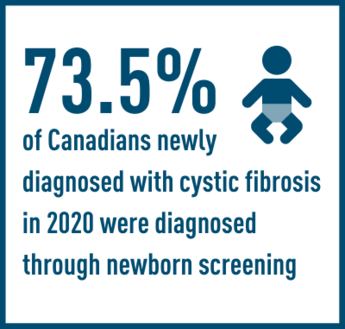CADTH FAILS TO FULLY RECOGNIZE GREATEST INNOVATION IN CYSTIC FIBROSIS HISTORY
Cystic Fibrosis Canada calls on the provinces to save lives and fund Trikafta now for all who can benefit
TORONTO, July 9, 2021 – The Canadian Agency for Drugs and Technologies in Health (CADTH) provided this week short sighted and narrow guidance regarding game changing cystic fibrosis (CF) drug Trikafta, that, if adopted by the provinces, could effectively exclude over 25% of eligible Canadians with cystic fibrosis (CF), many of whom are youth, who could greatly benefit from the drug. The CADTH review body issued a draft recommendation to provinces, noting they should list Trikafta on drug formularies, but with pricing and clinical conditions. It is Cystic Fibrosis Canada’s (CF Canada) position that CADTH’s draft recommendation narrowly and selectively interprets the science and overlooks what is best for patients. If adopted, it would effectively ration this life-changing medicine and will oblige the healthiest Canadians with CF to needlessly become sicker in order to access it.
Specifically, CADTH has recommended that provinces list Trikafta, but leave young Canadians with CF behind by limiting coverage to include only those with an FEV1, a measure of lung function, of 90% or less. It will force Canadians with cystic fibrosis to watch their health decline, accumulating unnecessary and irreversible damage before being eligible. The restrictive criteria in CADTH's draft recommendation do not recognize the complexity of this disease, ignoring one of the most significant benefits Trikafta could provide to patients: preventing disease progression.
What’s more, CADTH’s draft recommendation limits ongoing coverage to only those who see at least a 5% increase in FEV1, within six months of starting on the drug. This criterion is concerning because it does not acknowledge the many other benefits, like weight gain or reduced pulmonary exacerbations, that were seen in clinical trials. This would lead to Canadians losing access to a drug that makes their lives significantly better. Cystic Fibrosis Canada is pleased to see that CADTH has proposed in the implementation guidance that public payers consider these wider measures for staying on the drug and strongly encourages CADTH to move these into their final recommendation. Ultimately, these restrictive criteria, if followed, will tie the hands of Canada’s cystic fibrosis clinicians who are charged with preserving the health of Canadians with cystic fibrosis. Cystic Fibrosis Canada is working with CF clinicians to call on CADTH to expand both the initiation and positive response criteria in its final recommendation. Trikafta is the greatest innovation in CF treatment history. Those who need it, should get it. Those who benefit from it, should keep getting it.
“CF is a complex multi organ disease. The best use of healthcare dollars in all instances is in preventing disease. In fact, CF survival has dramatically improved over the years precisely because an aggressive regimen of therapy is initiated immediately on diagnosis. Why is Trikafta different? By narrowly defining accessibility and continuation criteria CADTH’s recommendation overlooks many of Trikafta’s significant benefits.” said Dr. John Wallenburg, Chief Scientific Officer, Cystic Fibrosis Canada. “If adopted by the provinces, CADTH’s draft recommendation will create an absurd situation in which patients will need to become demonstrably sicker to get this medicine and those who receive the drug and experience important clinical benefits, could see it pulled right out from under their feet.”
While CADTH’s recommendations can help inform provinces’ decisions to fund new medications, ultimately CADTH’s recommendations to provinces are non-binding. This means the provinces can choose to cover the drug now for anyone indicated by Health Canada. In fact, CADTH's recommendation suggests that the provinces consider additional measures beyond their direct recommendation. Health Canada approved the use of Trikafta in June 2021 to people aged 12 and up with CF and at least one F508del mutation. CF Canada calls on the provinces to trust their CF clinicians’ expertise and experience to prescribe the drug in accordance with their professional opinion. This would allow key health decisions to be informed by the care guidelines for comprehensive CFTR modulators that Canadian CF clinicians are developing in partnership with CF Canada.
Four provinces, including Ontario, Alberta, Prince Edward Island and Newfoundland and Labrador have already committed to funding Trikafta. CF Canada calls on these provinces to forge ahead with these commitments and put Product Listing Agreements in place immediately and for the other provinces to follow their lead.
“As a mother of two young adults with cystic fibrosis, this is my worst nightmare,” said Tammy Strong, mother of Mikayla, 20 and Madison, 18, who live with cystic fibrosis. “Trikafta was our greatest hope for their future, and now we live with the reality that one of our daughters, who has a lung function between 70-80%, will be eligible, while her sister, who has a lung function of 95% and also suffers from this devasting disease, will need to continue to decline in health, before she can access it. Knowing there is a miracle drug out there that can stop this disease in its tracks but is out of reach for some who need it, it's unconscionable.”
“CADTH’s recommendations are not aligned with the recommendations of Canada’s CF physicians, who almost universally disagree with the limitations CADTH has placed on access and continuation” said Dr. John Wallenburg. “We are counting on the provinces to do the right thing and save lives by immediately funding Trikafta for all Health Canada approved indications. Canadians with CF have one of the highest rates of survival in the world, a testament to the quality of Canada’s CF physicians, the real experts in this rare disease. Let’s ensure they aren’t handcuffed by these shortsighted recommendations and that they are the ones making the important clinical decision of who should access this life-changing drug.”
Trikafta’s cost effectiveness isstillbeing considered by the Institut national d'excellence en santé et services sociaux (INESSS) and BC Pharmacare. CF Canada encourages these regulatory bodies to follow clinical evidence and be more comprehensive in their recommendations. These review bodies will also make non-binding recommendations on whether their respective governments should pay for the drug, after which the provinces will decide if they will fund the medication.
Members of the community and supporters are invited to join a Facebook Live for #TrikaftaToday on July 9 at 4:00 pm EST on Cystic Fibrosis Canada’s Facebook page. The event, hosted in English, will bring the community together to discuss CADTH’s recommendation, and hear about next steps to gaining access to life-changing cystic fibrosis medications.
For CF advocacy news, subscribe to CF Canada’s advocacy e-newsletter ‘The Advocacy Brief’.
About cystic fibrosis
Cystic fibrosis is the most common fatal genetic disease affecting 4,344 Canadian children and young adults. There is no cure. Of the Canadians with cystic fibrosis who died in the past three years, half were under the age of 34. Cystic fibrosis is a progressive, degenerative multi-system disease that affects mainly the lungs and digestive system. In the lungs, where the effects are most devastating, a build-up of thick mucus causes severe respiratory problems. Mucus and protein also build up in the digestive tract, making it difficult to digest and absorb nutrients from food. In addition to the physical effects of the disease, mental health concerns are emerging; anxiety and depression are common among this population. Double lung transplants are the final option for patients with end-stage disease; most fatalities of people with CF are due to lung disease.
About Cystic Fibrosis Canada
Cystic Fibrosis Canada has dramatically changed the cystic fibrosis story. We have advanced research and care that has more than doubled life expectancy. Since being founded by parents in 1960, Cystic Fibrosis Canada has grown into a leading organization with a central role engaging people living with cystic fibrosis, parents and caregivers, volunteers, researchers and healthcare professionals, government and donors. We work together to change lives for the 4,344 Canadian children and adults living with cystic fibrosis through treatments, research, information and support. Despite our remarkable progress together, we are not yet done. Not when half of the Canadians with cystic fibrosis who died in the past three years were under the age of 34. We will keep pushing, keep going further until all people with cystic fibrosis can and do experience everything life has to offer —and enjoy everything life has to offer. Learn more at cysticfibrosis.ca.
For more information, please contact:
Jennifer Ouellette, Manager
Tel: 647-520-8593
Email: jouellette@cysticfibrosis.ca
Nicole Young, Director
Tel: (905) 317-5529
Email: nyoung@cysticfibrosis.ca



.jpg)
